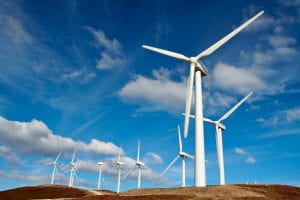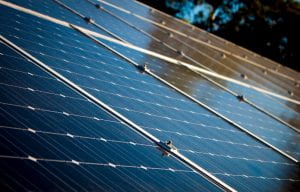
NEW! See our video on “Renewable Energy Research at Penn State”
YouTube site: Watch video
Most of the energy we use today is derived from fossil fuels, but in order to reduce global CO2 emissions all nations must world must undergo a rapid transition to a near carbon-neutral economy. That transition will require both adoption of existing renewable energy technologies, as well as development of new technologies and methods to integrate these technologies into our energy infrastructure. Penn State has been a leading institution in energy-related research for decades, but our work in renewable energy technologies, including solar, wind, and new energy conversion technologies, and energy storage research in batteries and fuel cells, has received insufficient attention. Penn State is now undergoing changes to provide a much greater focus on renewable energy technologies, in terms of both research and training of the engineers, scientists, and professionals that will help to transform our state and national energy infrastructure.

The purpose of the Energy 2100 initiative is to better integrate renewable energy technologies into our research, education, and outreach activities, and to promote and better advertise our work in helping to transform our energy infrastructure. The focus of this three-year initiative (2018-2021) is on research technologies that convert energy into useful forms, producing electricity or useful fuels such as hydrogen or methane gases from renewable sources. However, this initiative is for the first time pulling together information to make our work on renewable energy and related technologies better accessible to our students, alumni and the public. The pages on Research list faculty and staff actively engaged in different renewable energy technologies or associated activities, and the Education pages summarize degrees, minors, and certificates available in both resident instruction and online courses specifically related to renewable energy research.
 Transforming out energy infrastructure will require more than just capturing solar and wind power for electricity generation. We must further consider the energy sustainability of our water, food, and industrial infrastructures as we shift from a hydrocarbon to electrochemical platform based on water, hydrogen and electrons. The reduction of carbon emissions through energy conservation and changes in our activities are also important for addressing climate change. You can read about additional activities related to these other activities through the Sustainability Institute and the Institutes of Energy & Environment at Penn State.
Transforming out energy infrastructure will require more than just capturing solar and wind power for electricity generation. We must further consider the energy sustainability of our water, food, and industrial infrastructures as we shift from a hydrocarbon to electrochemical platform based on water, hydrogen and electrons. The reduction of carbon emissions through energy conservation and changes in our activities are also important for addressing climate change. You can read about additional activities related to these other activities through the Sustainability Institute and the Institutes of Energy & Environment at Penn State.
